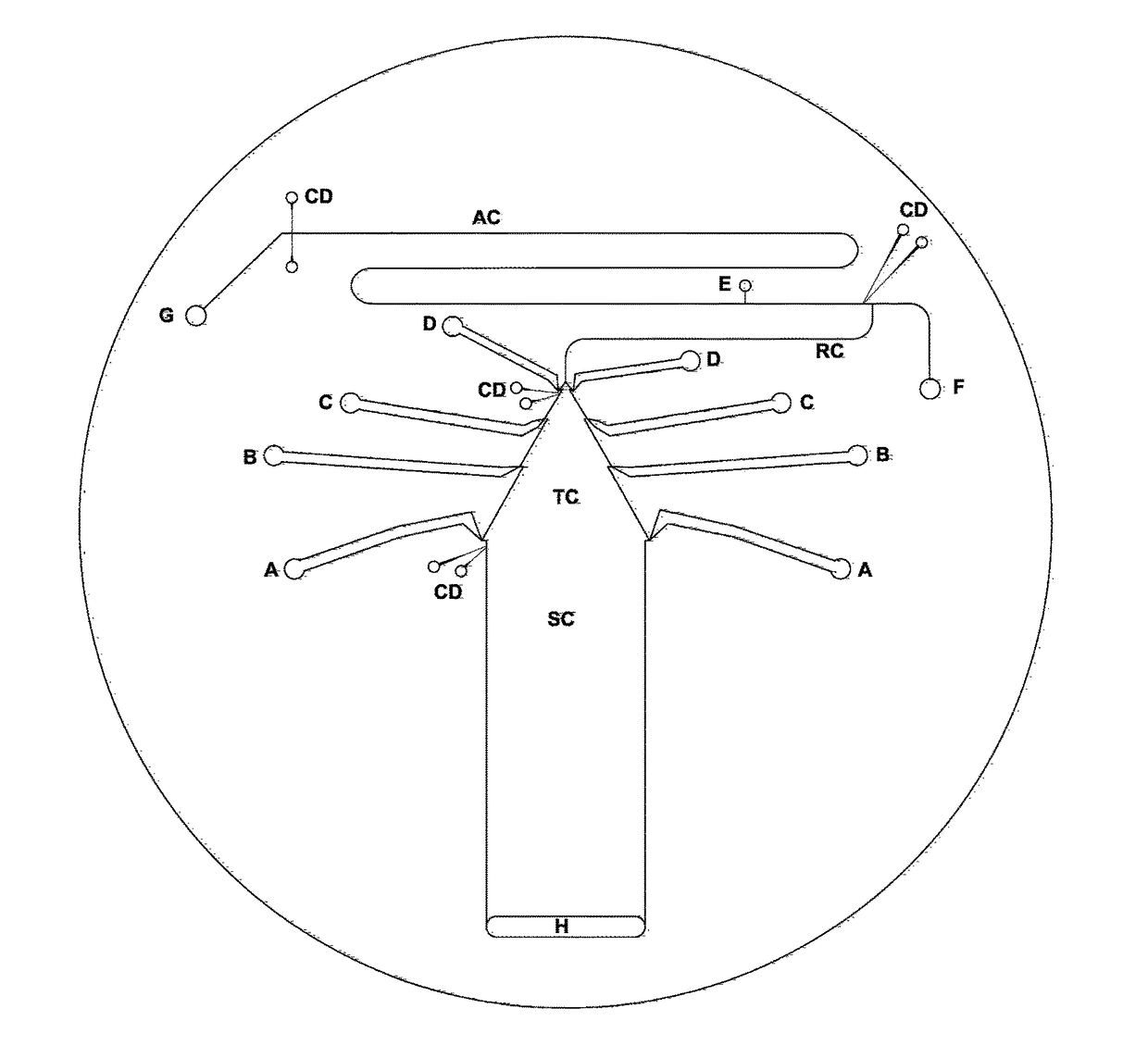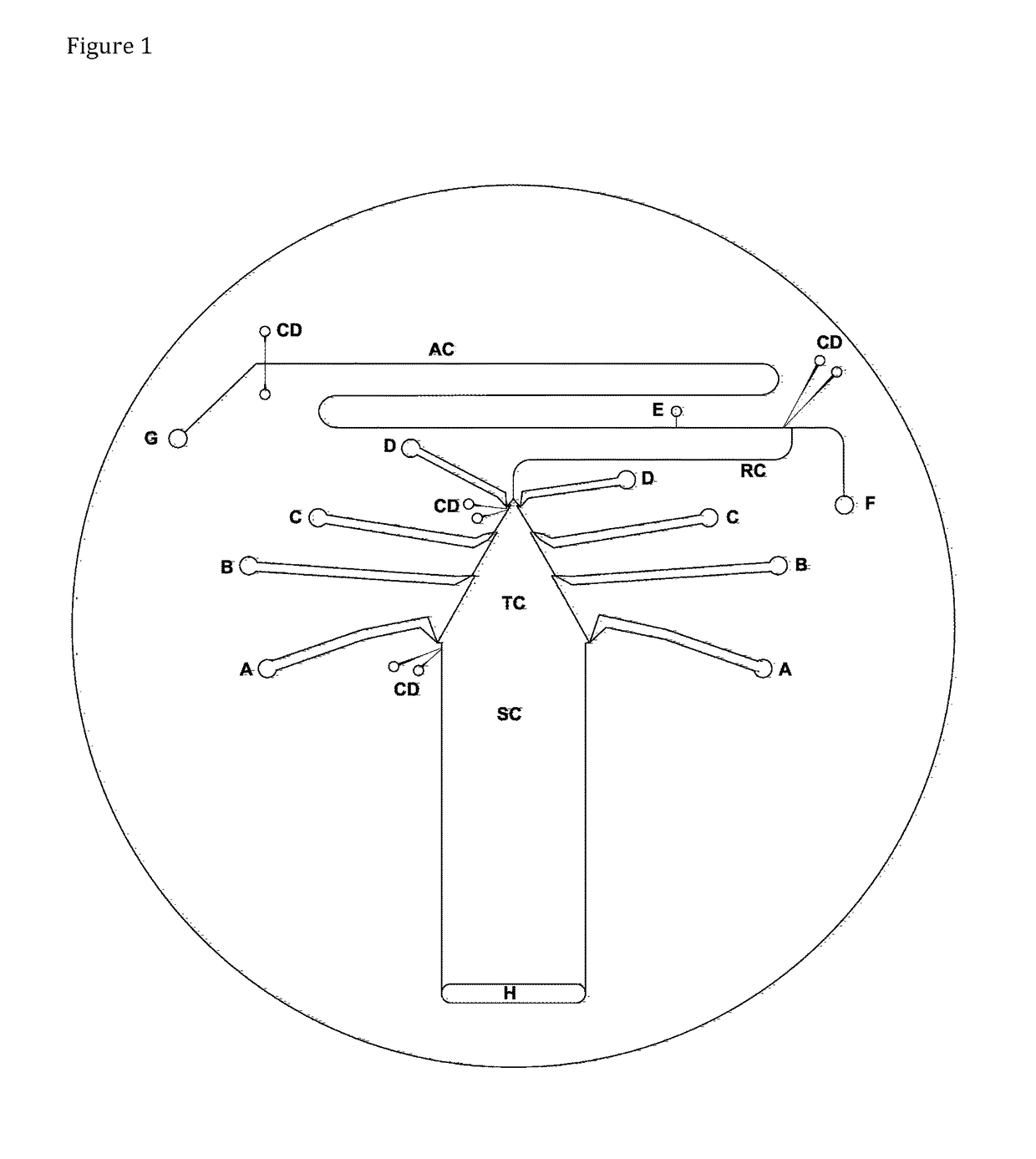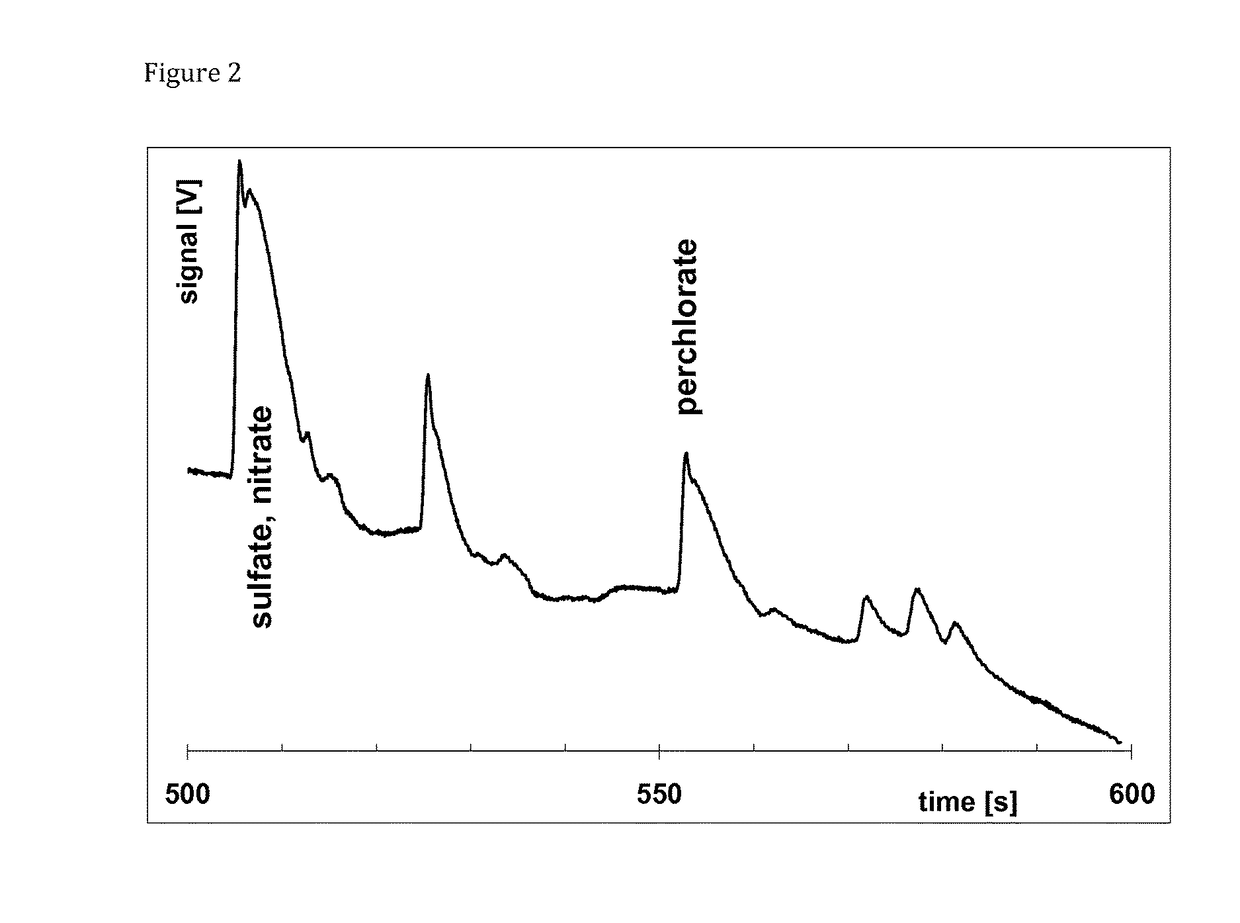Device and method for separation and analysis of trace and ultra-trace ionogenic compounds by isotachophoresis and zone electrophoresis on chip
a technology of ultra-trace ionogenic compounds and isotachophoresis, which is applied in the field of electrophoresis and analysis of trace and ultra-trace compounds, can solve the problems of limited detection sensitivity
- Summary
- Abstract
- Description
- Claims
- Application Information
AI Technical Summary
Benefits of technology
Problems solved by technology
Method used
Image
Examples
example 1
Preparation of Glass Chips
[0111]The chip was prepared from borofloat glass wafers 1.1 mm thick with diameter of 10.0 mm. After cleaning the wafers with piranha solution (mixture of 96% sulfuric acid and 30% hydrogen peroxide 9:1) at 120° C. for 20 min, a layer of amorphous silicon was applied in a furnace at 525° C. for 240 min in the presence of SiH4. Then the wafers were coated with hexamethyl disilazane at 110° C. and Shipley photoresist 3612 was applied. A Mylard mask with all the structures drawn on it was used to expose the photoresist layer with UV lamp for 10 s. The exposed photoresist layer was developed and the exposed silicon layer was removed by dry plasma etching in the presence of SF6 and chlorodifluoromethane (F22). Channels were etched with 49% HF at room temperature for 4.5-9 min. Holes of diameter 1.4 mm and 2.0 mm connecting the channels with outer world were drilled with diamond drills on wafers not coated with amorphous silicon. After cleaning all the wafers wit...
example 2
Chip for Isotachophoresis-Zone Electrophoresis
[0113]The chip for isotachophoresis-zone electrophoresis on chip contained said separation channel, which was 16 mm wide and 48 mm long. The height of said separation channel as well as the height of all other channels was approx. 45 μm. There was a sampling four-way valve V placed at the beginning of the separation channel, filled with the sample from said sampling inlet S towards said waste outlet W, behind said terminating electrolyte reservoir. In some setups, said sampling valve was eliminated and high-density samples were simply injected at the bottom of said terminating electrolyte. At the end of said separation channel, a pair of sensing electrodes for said tell-tale detector made from 25-75 μm platinum wire were attached. Behind said separation channel, said tapered channel followed, 24 mm long, reducing the cross section from 16 mm to approx. 130 μm. Four pairs of said side channels connected said tapered channel and leading el...
example 3
Electrolytes Used in the Analysis
Leading Electrolytes LE
[0114]1) 50 mM HCl, 100 mM β-alanine, 4 g / L hydroxyethyl cellulose (HEC)[0115]2) 50 mM HCl, 100 mM β-alanine, 4 g / L hydroxyethyl cellulose (HEC), 50 g / L α-cyclodextrin[0116]3) 50 mM HCl, 100 mM β-alanine, 50 g / L dextran, Mw 2×106 [0117]4) 50 mM HCl, 150 mM β-alanine, 4 g / L hydroxyethyl cellulose (HEC)[0118]5) 50 mM HCl, 150 mM β-alanine, 4 g / L hydroxyethyl cellulose (HEC), 50 g / L α-cyclodextrin[0119]6) 50 mM HCl, 50 mM β-alanine, 50 g / L dextran, Mw 2×106
Terminating Electrolyte TE
[0120]1) 100 mM glycolic acid[0121]2) 100 mM NaH2PO4 [0122]3) 100 mM mandelic acid[0123]4) 20 mM mandelic acid
Background Electrolytes BGE
[0124]1) 10 mM HCl, 20 mM β-alanine, 40 g / L α-cyclodextrin[0125]2) 10 mM HCl, 10 mM β-alanine, 40 g / L α-cyclodextrin[0126]3) 10 mM HCl, 20 mM β-alanine, 100 g / L poly(vinyl pyrrolidone), Mw 40,000[0127]4) 10 mM HCl, 10 mM β-alanine, 100 g / L poly(vinyl pyrrolidone), Mw 40,000,[0128]5) 10 mM HCl, 20 mM β-alanine, 100 g / L...
PUM
| Property | Measurement | Unit |
|---|---|---|
| width | aaaaa | aaaaa |
| width | aaaaa | aaaaa |
| width | aaaaa | aaaaa |
Abstract
Description
Claims
Application Information
 Login to View More
Login to View More - R&D
- Intellectual Property
- Life Sciences
- Materials
- Tech Scout
- Unparalleled Data Quality
- Higher Quality Content
- 60% Fewer Hallucinations
Browse by: Latest US Patents, China's latest patents, Technical Efficacy Thesaurus, Application Domain, Technology Topic, Popular Technical Reports.
© 2025 PatSnap. All rights reserved.Legal|Privacy policy|Modern Slavery Act Transparency Statement|Sitemap|About US| Contact US: help@patsnap.com



